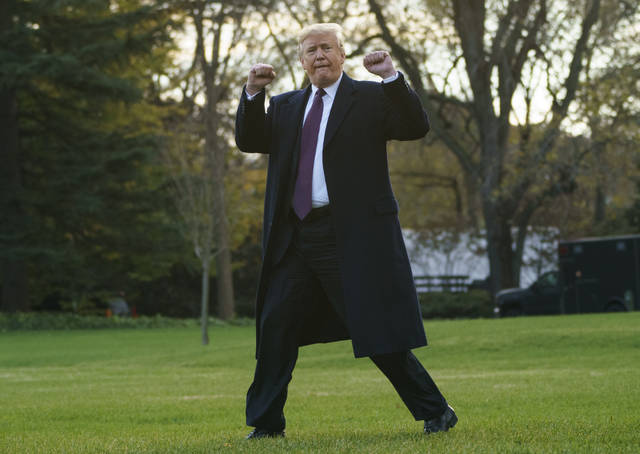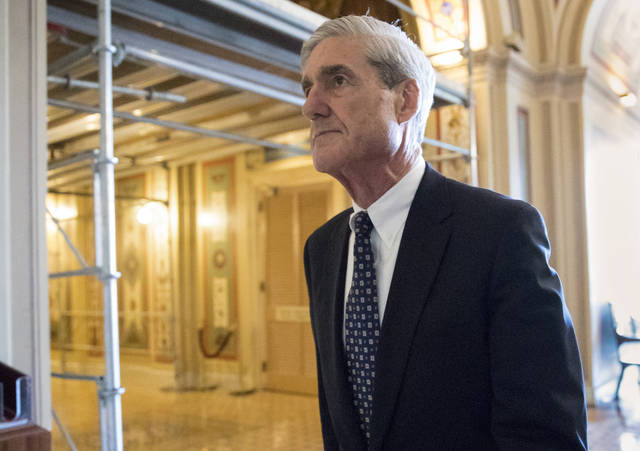Inside Trump’s refusal to testify in the Mueller probe

President Donald Trump gestures as he walks to Marine One after speaking to media at the White House in Washington, Tuesday, Nov. 20, 2018, for the short trip to Andrews Air Force Base en route to Palm Beach International Airport, in West Palm Beach, Fla., and on to and onto Mar-a-Lago. (AP Photo/Carolyn Kaster)

In this June 21, 2017, file photo, special counsel Robert Mueller departs after a meeting on Capitol Hill in Washington. In the months following Mueller’s May 2017 appointment, the White House pledged its cooperation, believing it the fastest way to end the investigation. The administration produced thousands of documents demanded by the special counsel and made close President Donald Trump aides _ including his legal counsel, chief of staff and press secretary _ available for questioning. (AP Photo/J. Scott Applewhite, File)
WASHINGTON — The date had been picked, the location too, and the plan was penciled in: President Donald Trump would be whisked from the White House to Camp David on a quiet winter Saturday to answer questions from special counsel Robert Mueller’s team.
WASHINGTON — The date had been picked, the location too, and the plan was penciled in: President Donald Trump would be whisked from the White House to Camp David on a quiet winter Saturday to answer questions from special counsel Robert Mueller’s team.
But as the Jan. 27, 2018, date neared and Mueller provided the topics he wanted to discuss, Trump’s lawyers balked. Attorney John Dowd then fired off a searing letter disputing Mueller’s authority to question the president. The interview was off.
Nearly a year later, Trump has still not spoken directly to Mueller’s team — and may never. Through private letters, tense meetings and considerable public posturing, the president’s lawyers have engaged in a tangled, tortured back-and-forth with the special counsel to prevent the president from sitting down for a face-to-face with enormous political and legal consequences.
The prolonged negotiation speaks to the high stakes for Trump, Mueller’s investigation of his campaign and the presidency. Any questioning of a president in a criminal investigation tests the limit of executive authority. Putting this president on the record also tests his ability to stick to the facts and risks a constitutional showdown.
The process took a significant step forward this week when Trump’s lawyers handed over the president’s written answers to some of Mueller’s questions. The arrangement was a hard-fought compromise. Trump answered only questions about Russian interference in the 2016 election and not questions about whether he has tried to obstruct the broader investigation into potential coordination between Russia and his presidential campaign. It’s unclear whether Mueller intends to push for more — either in writing or in person.
Special counsel spokesman Peter Carr declined comment.
Even those written answers were months in the making.
In the months following Mueller’s May 2017 appointment, the White House pledged its cooperation, believing it the fastest way to end the investigation. The administration produced thousands of documents sought by the special counsel and made close Trump aides — including his legal counsel, chief of staff and press secretary — available for questioning. White House lawyer Ty Cobb predicted the investigation could conclude by the end of that year.
But it soon became clear that Mueller would want to interview Trump, given his involvement in several events under scrutiny. The president had fired FBI Director James Comey, harangued his attorney general over his recusal from the Russia investigation and dictated a misleading statement about a Trump Tower meeting involving his son and a Kremlin-connected lawyer.
But Trump lawyers Dowd and Jay Sekulow moved cautiously.
The last time a president is known to have been interviewed in a criminal investigation was nearly 15 years ago, and a commander-in-chief has not been subpoenaed before a grand jury since 1998, when President Bill Clinton was summoned in the Whitewater case. Trump’s lawyers were mindful such an interview would be a minefield for a president who often misstates the facts. They set out to avoid it however possible, even if it could lead to resisting a subpoena and bringing on a court fight over presidential power.
But first they tried to head off a request. Trump’s lawyers staked out a bold constitutional argument, declaring they considered his actions as president outside a prosecutor’s bounds. Mueller had no right to question the president on any of his decisions made at the White House, they argued, saying any outside scrutiny of those choices would curb a president’s executive powers.
At the same time, they worked to undermine Mueller’s case should he choose to challenge that argument. They furnished a trove of White House documents about key moments in the investigation in hopes of undercutting any claim that he could only get the information he needed by questioning Trump, according to people familiar with the strategy.
Trump had other plans.
As his lawyers plotted to dig in against any interview, he pushed for one, believing it would exonerate him. In January, he burst into a reporters’ briefing with chief of staff John Kelly and insisted he was eager to speak to Mueller. He might do so in weeks, he said, “subject to my lawyers and all of that.”
“I would love to do that — I’d like to do it as soon as possible,” Trump said.
What he didn’t mention was that his attorneys had already discussed, and scuttled, the planned interview with Mueller. That process had even progressed to discussing logistics with Kelly, who advised of ways White House officials could get people in and out of the building without the press knowing.
But the interest cooled after Mueller team prosecutor James Quarles dictated over the phone 16 topics Mueller wanted to cover, including Trump’s interactions with Comey, his knowledge of national security adviser Michael Flynn’s interview with the FBI and his involvement in the Trump Tower statement. Dowd responded that the answers could all be found in documents and witness statements provided to Mueller. He then canceled the interview and days later drafted a feisty letter contesting the interview’s appropriateness and offering extensive explanations on the incidents in question.
The investigation has been “a considerable burden for the president and his office, has endangered the safety and security of our country, and has interfered with the president’s ability to both govern domestically and conduct foreign affairs,” Dowd wrote.
In the following months, Trump told some of his closest confidants that he still wanted to interview with Mueller, according to four White House officials and Republicans close to the White House who asked for anonymity because they were not permitted to publicly discuss private conversations. The president repeatedly insisted he had done nothing wrong and believed he could convince Mueller of that.
He told one confidant last spring he was frustrated his lawyers didn’t believe he should do it and snapped that he didn’t understand what was taking so long, according to one Republican in contact with the White House.
Tensions were on display at a March meeting where Dowd and Sekulow met with Mueller to discuss the need for an interview. Mueller said he needed to know if Trump had a “corrupt intent” when he fired Comey, such as by intending to stymie the investigation, according to a person familiar with the encounter. Dowd responded that the question was ridiculous and the answer was obviously no. Investigators at the same meeting raised the prospect of a subpoena if Trump didn’t cooperate, Dowd has said.
Later that month, Mueller’s team produced its most detailed list of questions yet — dozens, in different categories from Trump’s time as a candidate, through the transition period and into his presidency.
Trump’s own views soon began to shift. He had his first misgivings in mid-April after FBI raids on his personal lawyer Michael Cohen, thinking they were a sign that he could “not trust” Mueller, according to one of the Republicans close to Trump who spoke with the AP.
As Rudy Giuliani joined Trump’s legal team in April, the White House settled into a new strategy: Drag out the interview drama for months, and use that time to ratchet up attacks on Mueller’s credibility and complaints about the cost and time of the probe, according to the officials and advisers familiar with the strategy.
Giuliani led the charge. His scattershot arguments sometimes frustrated others in the White House, as he frequently moved the goalposts as to what would be required to have an interview. But the effect was to ensure the process would drag out longer.
Trump, meanwhile, continued complaining about the investigation even as his lawyers quietly negotiated acceptable interview terms.
A key breakthrough occurred earlier this fall when Mueller’s team said it would accept written answers on Russian election interference and collusion. The concession ensured that Mueller would get at least some on-the-record response from Trump. Prosecutors tabled questions about obstruction, reserving the right to return to that area later.
Giuliani seemed to foreclose future dialogue Tuesday, saying, “It is time to bring this inquiry to a conclusion.”
Whether Mueller agrees is a different story.

